

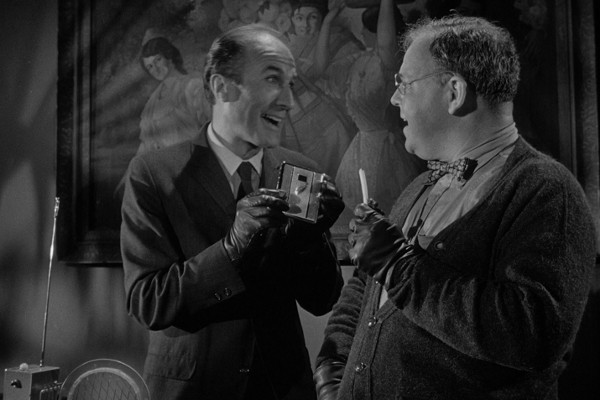
The best script from Leslie Stevens by a country mile. While cost-saving and sometimes broad - a murder scene replayed takes up over half an hour of the episode - it's actually handled deftly thanks to stars Barry Morse and Carroll O'Connor, taking remarks about Earth's use of nuclear power ("But it's nothing, they only use it to blow each other up") and making them likeable, rather than coarsely played.
Although I'm a Twilight Zone fan through and through (hence the name of the site – and I promise to drop the comparisons), I can't deny that Serling's show was an incredibly bad fit for comedy. For every success like Will the Real Martian Please Stand Up?, viewers were forced to sit through chronically broad efforts like Cavender Is Coming and The Bard. Serling wasn't much of a comedy writer, but then Leslie Stevens wasn't much of a straight SF writer, so it balances out.
Barry Morse said in his autobiography that this wasn't intended as an Outer Limits episode, but was in fact a failed pilot for a proposed SF comedy series. As it stands, it's the sole comedy effort in the entire show, and, by that standard, gives The Outer Limits a 100% success rate in the genre.

To fully appreciate The Outer Limits, you have to take it for the time it was made. A lot of the episodes don't contain universal themes for 2013, but are pulpish, 50s-style creations borne out of cold war fears. Multiple episodes reference such concerns directly, even down to the questionable taste of using stock footage of nuclear explosions, or name-checking Hiroshima. In The Architects of Fear, a group of scientists, determined to avert a holocaust, decide on the best solution.... going to parliament and petitioning for disarmament.
No, wait, they go that other logical route........ converting one of their number into an alien so that all the nations of the Earth will unite together in peace against it. A flawless, logical plan. Despite the ludicrous premise, it's all done rather effectively, with Robert Culp on fine form. Sadly, when his full conversion is complete, it's pretty hard not to laugh (although it was regarded, somehow, as too frightening at the time and censored), and the final line of dialogue is a hammer blow. But this part of the list is the best the series has to offer... from hereon in the quality takes a significant leap forward, and the subtexts get ever richer...
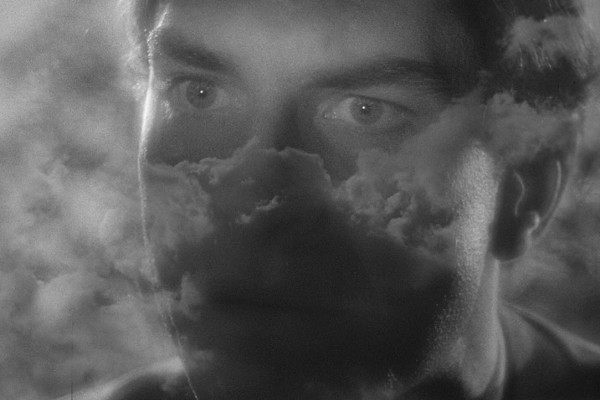
Despite being full of time-travel clichés and a title that gives away the entire plot, this one does it well because it has what a lot of the episodes lack: narrative progression. Martin Landau stars as a future mutation, travelling back in time to prevent a man who screwed up the Earth's future from ever being born.
Back in the past he meets a woman with the power to always be in soft focus, and tries the methods you'd expect: telling her and her fiancé about their son's future and trying to reason with them. Errrr... no, not that. I mean, talking obliquely so no one has a clue what he's on about, trying to wind up her potential husband and trying to break through the soft focus to seduce the girl.
The Outer Limits is famed for using noirish lighting techniques, and, while that generally holds true, it doesn’t feel like it here, with a very bland palette: it's almost like they filmed it in colour and turned it down, particularly in the cheap, Star Trekesque "future" backdrop. Such criticisms are minor, however, when the story compels, as here.
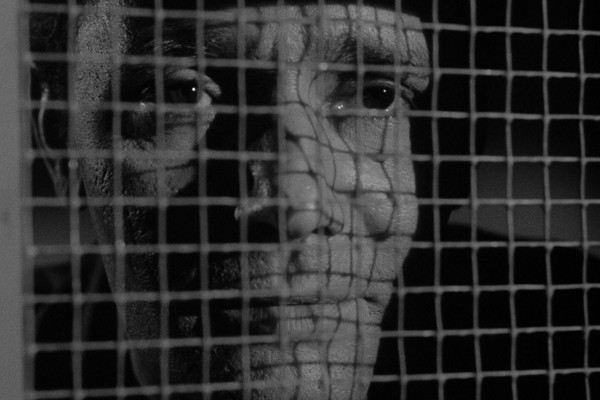
As noted, there's very little about The Outer Limits that says "1960s". Sure, the decade was only really just getting underway, and when this episode aired Dylan, The Beatles and The Stones were still fledging acts. But in the same year when Malcolm X was highly active and Martin Luther King had delivered his "I have a dream" speech, The Outer Limits was producing its 1950s-style concoction of monster of the week and crowd-pleasing romance.
Sure, the best episodes go much further than that, and use such tropes to make commentaries on the issues of the day, such as Vietnam. But this intriguing - if not quite suspenseful - tale of transferring thoughts to another mind does have some amusingly passionless caresses and orchestral sweeps. An interesting enough tale that does feel a little "tidy" in its plotting, but one which seems far nearer in time to Eddie Cochran than Jimi Hendrix.
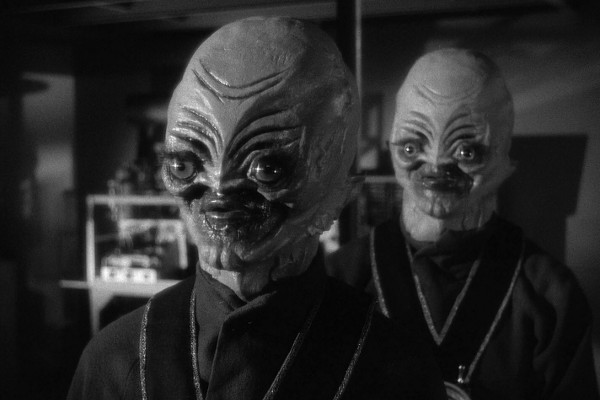
There's perhaps nothing more inexplicable about The Outer Limits than the decision to screen "teasers" of the episode before the opening credits. Only a handful of episodes opt for an alternative (either an in-story pre-credits sequence, or a straight titles opening) and the majority of them are hugely spoiler-insensitive.
Although you can sense the network screaming out for anything to boost the ratings, having a "teaser" that reveals plot twists that occur only five minutes before the end of the episode is an astonishing lapse of sense, with only the teaser to O.B.I.T. coming close for dunder-headed misguided decisions. You sense that, if the producers of the show were behind Agatha Christie adaptations, they'd show a scene with the Butler committing the murder before starting off the episode.
It's a shame, because this is one of the better stories, featuring arguably the best-realised aliens in the show and a fine lead performance from Robert Duvall. Sadly, he doesn't always get great back up... Henry Brandon sounds like a man reciting his lines from memory, rather than really living the part. But more importantly, relations between the network and Joe Stefano were now at a low. The constant creative interference, the cutting back of budget... it had all taken its toll, and with this, the penultimate episode of season one, Stefano was now ready to leave The Outer Limits after just one season.
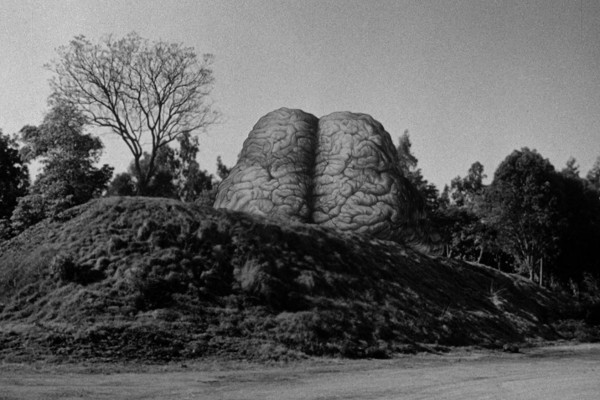
The styles, tones and maturity of each Outer Limits episode vary so wildly I've had more doubts about the ranking order than in any other "Worst To Best" feature I've ran so far. Comparing Earth-bound war parallels with goofy space monster serials isn't easy, and there's certainly qualms to be had with The Guests. It's an episode that ends with a cheesy "love conquers all" moral, one that one wanders off its initial creepy path. Yet it's also an episode where what looks like a pulsating vagina keeps ancient people prisoner in a house that's really a giant brain. Be honest... what more could you want out of life?
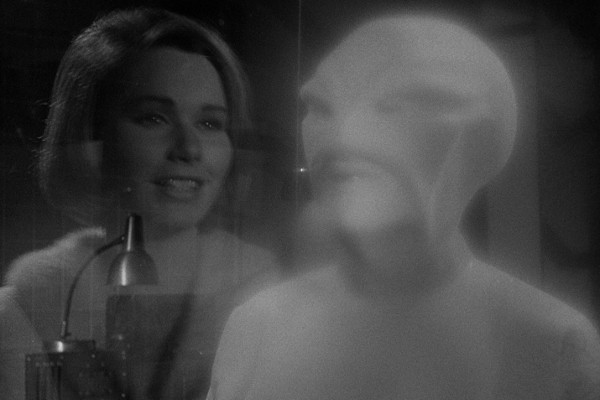
Suggested by many as The Outer Limits' take on Macbeth, what makes a fairly mediocre episode of the show so compelling is another of Stefano's censor-defying allusions to homosexual characters in his narrative, as with The Invisibles.
There's suggestions throughout that Martin Landau's nakedly ambitious, murderous wife is having an affair with the female housekeeper, and regards her marriage as a mundane arrangement of convenience. It appears Landau's Richard Bellero also suspects this, as he vaguely questions the housekeeper, with her responses unusually pointed and waspish for a hired help: "Does my wife ever confide in you about me?" "Sometimes when she is dreaming I'm there. So she dreams aloud." "Has she ever dreamed of leaving me?" "For what? Leaving you for what?" "For some other pretender to a more accessible throne." "Mrs. Bellero is loyal." "Yes, but... to whom?" This is not to suggest that Stefano regarded homosexuals as morally questionable, perhaps more that he regarded their inclusion as "flavouring" in the narrative.
When Bellero accidentally beams an alien to Earth and it is shot, it brings about a power struggle for its knowledge. Although the alien looks like a man in a cheap suit, it's heavily implied that the alien is wearing some outer garments and that the real creature exists within. Nevertheless, this is perhaps the least interesting element of the episode, though Conrad Hall's cinematography keeps the whole thing looking above standard. Sadly, the same can't always be said of John Brahm's direction... in a confrontation scene on the stairs between the housekeeper and Bellero's father, he appears to briefly break the 180 degree line... though this could, perhaps, be intentional to elevate the drama.
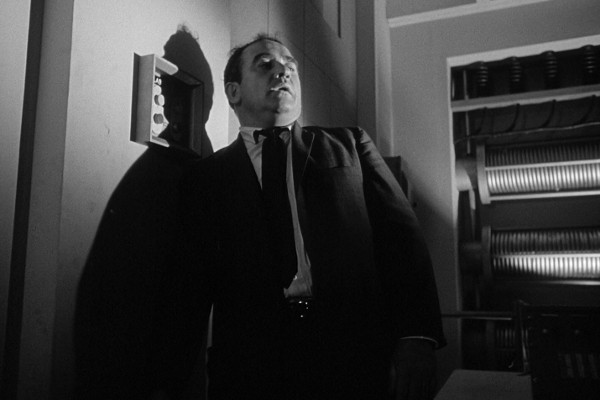
One interesting thing that Joe Stefano liked to indulge in (as with his later, weaker script for A Feasibility Study) is in subverting audience expectation of who the lead characters actually are.
It's a clever conceit, because it means you never quite know who will live or die from one scene to the next. This one opens (after a rare in-story teaser) with Michael Forest as a Professor about to work in a special lab. 31-year-old Scott Marlowe is there merely as a secondary character to support Forest, playing his kid brother. However, Forest is killed by an energy creature less than 15 minutes into the runtime, and the oldest-looking 20-year-old in the world suddenly takes over the focal point of the episode. This is until his character gets nudged into the sidelines and Ed Asner's detective begins to demand attention, if only for his enthusiastic back rubs.
It's this final change in focus which does make the episode lose some of its appeal: while Asner is always a fine presence, the narrative shifts perhaps distance the viewer too much, particularly in a story that requires an even larger than usual suspension of disbelief. However, the lack of clear resolution - the creature is only contained, not destroyed - do end this one on a satisfying note.